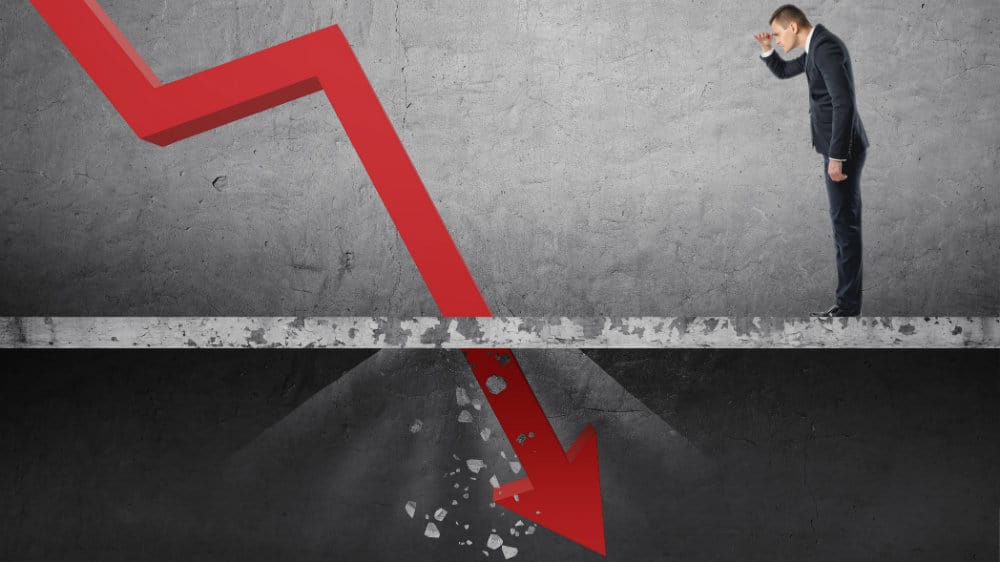As I wrote yesterday, I’m increasingly concerned about the growing risks of a stock market crash. Indeed, after three years of strongly rising global share prices, such a setback wouldn’t come as any surprise to me. As asset prices inflate, markets become less stable, which usually leads to heightened volatility. That’s something we’ve definitely seen since the end of 2021, especially among US stocks. However, each stock market crash is unique, so here are five lessons to take away from previous UK bear (falling) markets.
1. Some stock market crashes last years
The broad-based FTSE All-Share index has been around since 1962. According to investment platform A J Bell, this UK index has undergone 11 bear markets in 59 years. Some of these lasted several years. For example, from 31 January 1969 to 27 May 1970, the FTSE All-Share lost 37% of its value in a 481-day bear market. Even worse, from 15 August 1972 to 6 January 1975, the index collapsed by 72.6% over 874 days. But the longest post-1962 bear market lasted 1,167 days from 31 December 1999 to 12 March 2003. During this time, the FTSE All-Share more than halved, losing 50.9% of its value. I remember this long, drawn-out stock market crash almost as though it were yesterday.
5 Stocks For Trying To Build Wealth After 50
Markets around the world are reeling from the coronavirus pandemic… and with so many great companies trading at what look to be ‘discount-bin’ prices, now could be the time for savvy investors to snap up some potential bargains.
But whether you’re a newbie investor or a seasoned pro, deciding which stocks to add to your shopping list can be a daunting prospect during such unprecedented times.
Fortunately, The Motley Fool UK analyst team have short-listed five companies that they believe STILL boast significant long-term growth prospects despite the global upheaval…
We’re sharing the names in a special FREE investing report that you can download today. And if you’re 50 or over, we believe these stocks could be a great fit for any well-diversified portfolio.
2. And some are over in months
Not all UK stock market crashes are multi-year meltdowns. Thankfully, some are mercifully brief. For instance, the bear market from 17 August to 28 September 1981 lasted just 42 days, when the index dropped by 21.5%. Likewise, the 63-day bear market of 6 June to 8 August 1975 left the index 20.8% lower. And most recently, the ‘2020 flash crash’ lasted 62 days from 17 January to 19 March, plunging 37.2% before rebounding. I expect you remember this latest, brief bear market?
3. Some stock market crashes are brutal
Here in the UK, we endured two terrible stock market crashes in this millennium. From 31 December 1999 to 12 March 2003, the FTSE All-Share index collapsed by 50.9% during the ‘dotcom bust’. During the global financial crisis, the index crashed by 48.6% from 25 June 2007 to 3 March 2009. But the big daddy of all UK bear markets lasted from 15 August 1972 to 6 January 1975. With the oil price quintupling and UK inflation (consumer prices) exploding, this index imploded, losing almost three-quarters (-72.6%) of its value. Yikes.
4. Share prices sometimes take years to recover
After stock market crashes, it usually takes prices longer to recover than they did to fall. On eight out of 10 occasions (excluding the 2020 crash), the FTSE All-Share took longer to make up lost ground than it did to lose it. The average market downturn lasted 385 days, versus an average of 648 days to recover from bear-market losses. The longest recovery lasted 1,529 days from 3 March 2009 to 10 May 2013. Nasty.
5. Shares eventually bounce back
Based on the FTSE All-Share index, the average UK stock market crash since 1962 has lasted just over a year. Meanwhile, the average fall has been 36%. But on every occasion (including January 2020 to now), the index has eventually bounced back to reach higher highs. This tells me that buying quality stocks during bear markets tends to pay off handsomely in the long run. For example, in 2002, the UK stock market crashed by roughly a quarter. But by buying cheap, bombed-out shares, I almost tripled my money in that terrible year.
Finally, until I can see a good reason to stop, my family portfolio will keep buying cheap UK shares with high earnings yields and fat dividends!
Our 5 Top Shares for the New “Green Industrial Revolution”
It was released in November 2020, and make no mistake:
It’s happening.
The UK Government’s 10-point plan for a new “Green Industrial Revolution.”
PriceWaterhouse Coopers believes this trend will cost £400billion…
…That’s just here in Britain over the next 10 years.
Worldwide, the Green Industrial Revolution could be worth TRILLIONS.
It’s why I’m urging all investors to read this special presentation carefully, and learn how you can uncover the 5 companies that we believe are poised to profit from this gargantuan trend ahead!
Access this special “Green Industrial Revolution” presentation now
Cliffdarcy has no position in any of the shares mentioned. The Motley Fool UK has recommended Morrisons and Ocado Group. Views expressed on the companies mentioned in this article are those of the writer and therefore may differ from the official recommendations we make in our subscription services, such as Share Advisor, Hidden Winners and Pro. Here at The Motley Fool, we believe that considering a diverse range of insights makes us better investors.
This post was originally published on Motley Fool







